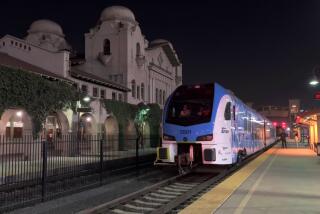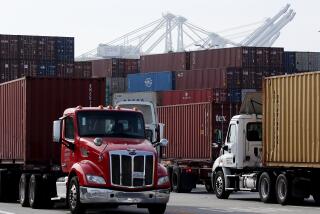Cleaner Truck Engine Is Built : * Pollution: California’s tough emission standards are met by the first methanol-powered engine, developed by a Detroit firm.
- Share via
DETROIT — In a step toward eliminating smoke-belching trucks and transit buses from the road, Detroit Diesel Corp. has built the first methanol-powered engine for heavy duty vehicles that meet new, tougher California emission standards, the company said Friday.
The alternative-fuel engine, which was developed and tested primarily in California, reduces by 90% the soot-like pollutant emissions that pour out of the tailpipes of diesel trucks and transit buses as required by 1991 standards established by the California Air Resources Board for new heavy duty vehicles.
Methanol engines cost about $30,000 more than diesels, and their average life is about 100,000 miles shorter. But with the California market closed to new vehicles that don’t meet its standards and similar requirements of the federal Clean Air Act about to be phased in, engine and vehicle manufacturers are increasingly pressed to create technology that can comply with the law.
Cynthia Barker, a spokeswoman for the California Energy Commission, said other engine manufacturers will likely follow closely in Detroit Diesel’s tracks. “What’s significant about this is that Detroit Diesel is the first one through the door,” Barker said.
Cummings Engine Co. and Navistar International Corp. are all in the Energy Commission’s program to test methanol engines in heavy duty vehicles.
The Detroit Diesel methanol-powered engine is expected to be used primarily in transit buses throughout California. “Detroit Diesel has been working for over 10 years to get there, we’ve made a $10-million investment to get there, and we are there,” company spokeswoman Nancy Martin said.
Bill Sessa, a spokesman for the California Air Resources Board, said the approval of the Detroit Diesel engine is particularly important because unlike some of the other alternative-fueled engines under experimentation, it has broad applications for everyday use.
“It is very significant. This is really the first engine that’s going to be used in everyday transit buses that meets our 1991 standards,” Sessa said, “and for all practical purposes that means the engine emissions will be smokeless.”
The only other alternative-fueled engine to meet the new emissions standards for heavy duty vehicles, Sessa said, is a compressed natural gas-powered engine made by the Waltham, Mass.-based Tecogen Inc., and its use is limited to school buses.
Thirty of the Detroit Diesel engines have been powering Southern California Rapid Transit District buses for the past two years, and after 1.5 million miles of ironing out the bugs, said Rich Davis, RTD equipment manager, “26 of them are out in the street making money.”
The main drawback, Davis said, is that methanol costs about twice as much as diesel fuel. The methanol-powered buses are also “a shade” behind the diesel buses in terms of performance, Davis said, but the RTD is nevertheless getting ready to put 220 more Detroit Diesel engines on the street.
“It’s the only certified engine you can buy now,” Davis said. “We’re kind of in a bind, because the law says you have to have engines with a certain level of emissions, and there are not a lot of them available.”
Detroit Diesel’s methanol-powered engine, in production since January, was primarily built to meet the future emissions standards, the company said in a statement. And although the engine is expected to account for less than 1% of the company’s sales next year, Martin said, “it shows what can be done.”
Detroit Diesel, one of the largest makers of truck and bus engines in the country, is 80% owned by Penske Transportation Holding Corp. and 20% by General Motors Corp. Formal emission certification ceremonies will be held at the company’s headquarters in Detroit on Tuesday.






